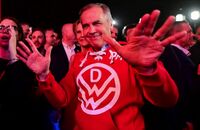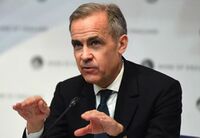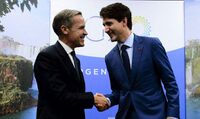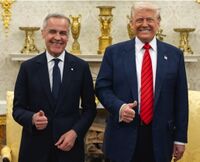Mark Carney
Bankers, like proctologists, rarely transition into politics. In the past, plenty of politicians have moved into finance, but rarely vice versa. Yet this is what Mark Carney did in Canada in 2025 — trade in basis points for counterpoints, derivatives for dissemblance.
If you were searching someone with anti-charisma, then the slim, anal-retentive-looking Carney is money in the bank! At various times, he has headed the Bank of Canada and the Bank of England. In the latter role in 2016, after the Brexit referendum created a vacuum, British Prime Minister David Cameron had been gelded in public and lost all his authority. The Brexiteers themselves were equally speechless. Only Carney, leading the Bank of England, was able to talk about how to snatch stability from the jaws of this chaos.
Background[edit]
Mark Joseph Carney was born 16 March, 1965 in Fort Smith, Northwest Territories. The reader who can barely find Canada on a map will never locate Fort Smith. Not wishing to become a moose-wrestler like his classmates, Carney moved to relatively cosmopolitan Alberta. Considering himself more Irish than Canadian (and resembling a leprechaun), Carney chose a career in finance. It was either pursue the Pot O' Gold or become a Catholic priest — which may explain why he got an Irish passport in the early 1980s.
Money, money, money[edit]
Carney quickly acquired degrees from Harvard and Oxford. He liked money — lots of it. After finishing his doctoral thesis, Money, Money, Money: Why is it Always Sunny in a Rich Man's World? — which he also sang note-perfect at his dissertation — Carney landed a job at Goldman Sachs. He could basically write his own cheques. Not long after, the Bank of Canada tapped Carney for a job. His first task was to save the Canadian economy from the crash of 2008-2009. He failed.
Who's the lousy banker?[edit]
Though Carney's time at the Bank of Canada did not deliver results for his employer, it did deliver results for Carney, serving as a stepping stone to another top banking job, this time to an institution dating back to 1694, the grand old Bank of England. They had wanted an American financial whiz with Federal Reserve experience. But that candidate demanded too high a salary — and a season pass to watch the horses race at Ascot. So they got Mark Carney, the runner-up.
The new Conservative Prime Minister, David Cameron, was impressed by the smooth-talking Carney. As neither he or his chancellor of the Exchequer, George Osbourne, knew the first thing about finance, they relied on Carney to give them data — and street-cred. Cameron intended that Britain barge into the European Union and offered the nation his signature referendum — the one where the choices were In, Out, and Shake-it-all-About. The campaign would be fought on Cameron's 'new deal' for the UK inside the EU. Cameron was rebuffed by the EU and then lost the referendum, when a large bloc of his own MPs including Boris Johnson sided with UKIP leader Nigel Farage.
With Cameron now a busted flush, it was revealed Johnson had no plan for how to start his Brexit policies either. But as they say — Money talks, bullshit makes florid speeches. The money markets listened to Carney — a bloody Canadian!
Heir to Trudeau?[edit]
Carney remained the governor of the Bank of England into the Boris Johnson era, the Carney Cuckoo sitting in a nest of Brexit true believers. Johnson was tempted to sack him, but was even more scared by negative market reactions than Liz Truss would be later. So Carney was allowed to run out his contract and got an honourable discharge in 2020.
Carney returned to Canada but needed new diversions. He was a natural centrist conservative, with enough money and pensions to retire and spend his time watching Ottawa Senators hockey and goading the players into fights. Instead, he became an informal economic advisor to Prime Minister Justin Trudeau. In this role, he made the astonishing but useful discovery that he was a political Liberal.
As Trudeau's reputation as the Chief Woke of Canada ebbed, the chance of another Liberal leader becoming prime minister looked remote. Canadian Tories (the Maple MAGA) looked set to triumph. In January 2025, Trudeau resigned as Prime Minister and then re-appointed himself as Caretaker PM. Carney announced he would stand. He had never been MP at either provincial or federal level, but he crushed his Liberal rival Chrystia Freeland (whom Trudeau had famously demoted) and then went on to beat the Conservatives in the general election.
Dealing with Trump[edit]
Mark Carney didn't immediately contact Trump. He needed time to work out a strategy. In May 2025 Carney came face to face with Trump.
To be contiuned.
| Preceded by: Justin Trudeau |
Prime Minister of Canada 2025– |
Succeeded by: Mickey Mouse is tanned, rested, and ready |





